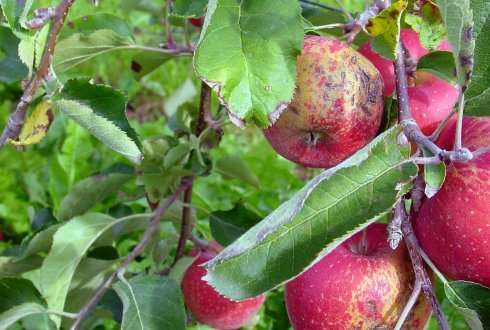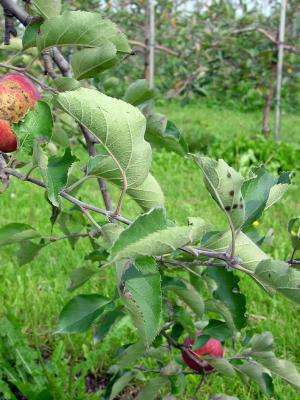Testing new biological plant protection products for effectiveness and practical feasibility

A naturally occurring fungus codenamed 'H39' might be the long-sought biological defence against the dreaded apple scab. "This fungus has not only been tested for its ability to fight the pathogen. The new Select BioControl method was also used to immediately assess the practical feasibility of deploying it as a commercial product," says Dr Jürgen Köhl of Wageningen University and Research Centre.
Antagonist
Apple scab is caused by the fungus Venturia inaequalis and is the pathogen responsible for the most economic damage in apple cultivation worldwide. The only means found to suppress it to date have been synthetic substances, against which it often develops a resistance. "In our search for a biological alternative we looked at the various fungi that are naturally found in the places where scab occurs," Köhl explains. "And we asked ourselves which of these fungi might be able to counteract the Venturia as a so-called antagonist. Cladosporium cladosporioides, also known as 'H39', was one of the front runners."
Field tests
Field tests in several European countries subsequently demonstrated that this fungus is in fact able to prevent the formation of scab on leaves and fruits, in both organic and normal commercial production systems. "Next, we also examined whether the antagonist was resistant to low temperatures and drought, and whether it could be produced in commercially viable quantities. 'H39' passed all these tests. A manufacturer of biological plant protection products is currently looking at possibilities of bringing it to market."

This approach to potentially interesting biological plant protection agents through the Select BioControl roadmap is, according to Köhl, clearly different from common practice. "Until now, we were too focused on the efficacy of the antagonist. But there are other criteria important in the commercialisation of a biological crop protection product, such as cost effectiveness and the possibilities in terms of protection of intellectual property. Working together with the private sector at an early stage and including all the other feasibility aspects in the tests means that there is a much higher probability that research will actually lead to a successful biological control product."
Given the success of 'H39', Köhl stressed that the approach through Select Biocontrol is also suitable for other potentially interesting biological plant protection products. "The EU project BIOCOMES resulted in another interesting collection of fungi, including potential antagonists that counteract powdery mildew in wheat. We plan to further develop these products via an approach focused on effectiveness and feasibility."
More information: "Towards an Integrated Use of Biological Control by Cladosporium cladosporioides H39 in Apple Scab (Venturia inaequalis) Management." dx.doi.org/10.1094/PDIS-08-14-0836-RE
"Stepwise screening of microorganisms for commercial use in biological control of plant-pathogenic fungi and bacteria," Biological Control, Volume 57, Issue 1, April 2011, Pages 1-12, ISSN 1049-9644, dx.doi.org/10.1016/j.biocontrol.2010.12.004.
Provided by Wageningen University


















